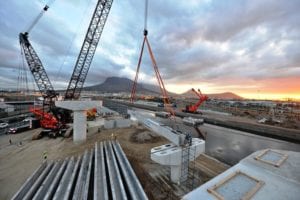The practice of collusion was almost entrenched in South Africa’s construction and engineering industry, says the advocate who led the Competition Commission’s fast-track settlement process into collusion in the construction industry.
Oliver Josie, acting deputy commissioner of the Competition Commission, speaking at a recent Wits law school seminar, said senior members of construction and engineering groups were part of numerous cartels in Gauteng, the Western Cape and KwaZulu-Natal. Josie said, particularly ahead of the 2010 World Cup, construction cartels used ledgers to ensure that tenders awarded for projects were fairly divided between the companies. The commission identified 300 collusion cases in projects worth R47 billion between 2000 and 2010. However, it limited its investigations to 160 projects between early 2006 to late 2009, fining15 construction and engineering firms a total of R1.46 billion.According to Josie, normal margins in large infrastructure projects are between 5% and 6%. Margins in the building of 2010 World Cup stadiums was found to be up to 16.5%. “One can see immediately that the competitive bidding process was sidelined. Municipalities started to see that costs were much higher than initially anticipated,” Josie said.
Josie said the fast-track settlement process had a very detrimental impact on share prices and caused construction and engineering firms reputational damage.






